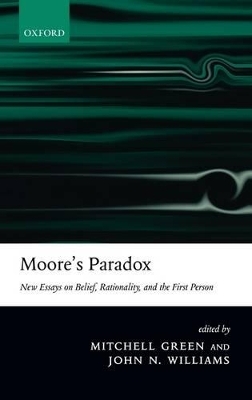
Moore's Paradox
New Essays on Belief, Rationality, and the First Person
Seiten
2007
Oxford University Press (Verlag)
978-0-19-928279-1 (ISBN)
Oxford University Press (Verlag)
978-0-19-928279-1 (ISBN)
G. E. Moore observed that to assert, 'I went to the pictures last Tuesday but I don't believe that I did' would be 'absurd'. Over half a century later, such sayings continue to perplex philosophers. In the definitive treatment of the famous paradox, Green and Williams explain its history and relevance and present new essays by leading thinkers in the area.
G. E. Moore famously observed that to assert, 'I went to the pictures last Tuesday but I don't believe that I did' would be 'absurd'. Moore calls it a 'paradox' that this absurdity persists despite the fact that what I say about myself might be true. Over half a century later, such sayings continue to perplex philosophers and other students of language, logic, and cognition. Ludwig Wittgenstein was fascinated by Moore's example, and the absurdity of Moore's saying was intensively discussed in the mid-20th century. Yet the source of the absurdity has remained elusive, and its recalcitrance has led researchers in recent decades to address it with greater care.
In this definitive treatment of the problem of Moorean absurdity Green and Williams survey the history and relevance of the paradox and leading approaches to resolving it, and present new essays by leading thinkers in the area.
Contributors
Jonathan Adler, Bradley Armour-Garb, Jay D. Atlas, Thomas Baldwin, Claudio de Almeida, André Gallois, Robert Gordon, Mitchell Green, Alan Hájek, Roy Sorensen, John Williams
G. E. Moore famously observed that to assert, 'I went to the pictures last Tuesday but I don't believe that I did' would be 'absurd'. Moore calls it a 'paradox' that this absurdity persists despite the fact that what I say about myself might be true. Over half a century later, such sayings continue to perplex philosophers and other students of language, logic, and cognition. Ludwig Wittgenstein was fascinated by Moore's example, and the absurdity of Moore's saying was intensively discussed in the mid-20th century. Yet the source of the absurdity has remained elusive, and its recalcitrance has led researchers in recent decades to address it with greater care.
In this definitive treatment of the problem of Moorean absurdity Green and Williams survey the history and relevance of the paradox and leading approaches to resolving it, and present new essays by leading thinkers in the area.
Contributors
Jonathan Adler, Bradley Armour-Garb, Jay D. Atlas, Thomas Baldwin, Claudio de Almeida, André Gallois, Robert Gordon, Mitchell Green, Alan Hájek, Roy Sorensen, John Williams
I. INTRODUCTION AND HISTORICAL CONTEXT; II. MOORE'S PARADOX AND KNOWLEDGE; III. MOORE'S PARADOX, BELIEF, AND ASSERTION; IV. MOORE'S PARADOX AND CONSCIOUSNESS; V. ARGUMENTS FROM MOORE'S PARADOX
| Erscheint lt. Verlag | 1.3.2007 |
|---|---|
| Verlagsort | Oxford |
| Sprache | englisch |
| Maße | 162 x 240 mm |
| Gewicht | 506 g |
| Themenwelt | Geisteswissenschaften ► Philosophie ► Erkenntnistheorie / Wissenschaftstheorie |
| Geisteswissenschaften ► Philosophie ► Logik | |
| Geisteswissenschaften ► Philosophie ► Philosophie der Neuzeit | |
| Geisteswissenschaften ► Philosophie ► Sprachphilosophie | |
| Geisteswissenschaften ► Sprach- / Literaturwissenschaft ► Sprachwissenschaft | |
| ISBN-10 | 0-19-928279-X / 019928279X |
| ISBN-13 | 978-0-19-928279-1 / 9780199282791 |
| Zustand | Neuware |
| Informationen gemäß Produktsicherheitsverordnung (GPSR) | |
| Haben Sie eine Frage zum Produkt? |
Mehr entdecken
aus dem Bereich
aus dem Bereich
Buch | Softcover (2023)
Reclam, Philipp (Verlag)
7,00 €
die Grundlegung der modernen Philosophie
Buch | Softcover (2023)
C.H.Beck (Verlag)
18,00 €
die Evolution des Geistes
Buch | Softcover (2025)
Suhrkamp (Verlag)
30,00 €
![Was heißt Denken?. Vorlesung Wintersemester 1951/52. [Was bedeutet das alles?] - Martin Heidegger](/media/113619842)

